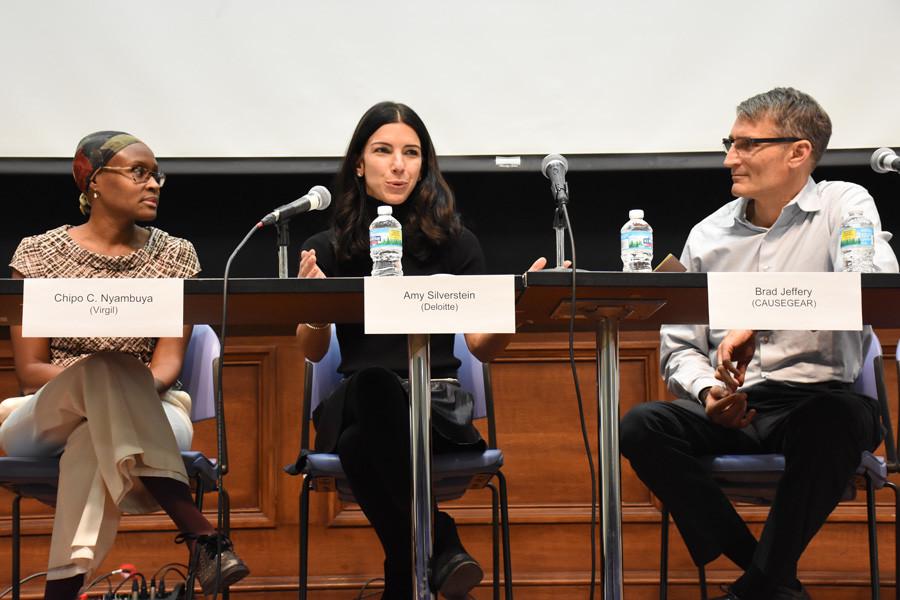Panelists discuss the power of consumer choices to combat human trafficking
Sophie Mann/Daily Senior Staffer
Amy Silverstein of Deloitte discusses the impact of choosing fair trade products to combat human trafficking during a panel organized by student group Fight for Freedom. The panel emphasized the role of business and consumer responsibility in ethical labor practices.
January 29, 2016
College students can do more than merely hope for change — they can help create it, lawyer Chipo Nyambuya said in a talk as part of Northwestern’s Human Trafficking Awareness Week.
About 20 people gathered Thursday in Harris Hall to learn how consumers’ shopping choices and employers’ business practices affect the lives of millions. By purchasing cheap products, shoppers reinforce companies’ decisions to offer low wages and perpetuate poverty among those desperate for work, said panelist Brad Jeffery, founder and CEO of Chicago-based apparel company Causegear.
Jeffery was one of three speakers who all work in corporate social responsibility brought to campus by Fight for Freedom, a student group advocating against human trafficking.
Nyambuya, one of the panelists, said people tend to not engage with solutions to problems of human trafficking.
“A lot of us don’t speak out,” she said. “We’re not intentional about our values being aligned with how we engage — silence equals consent.”
Change starts by looking into our daily lives, Nyambuya said. Easy ways to help include noticing where our money is spent, the topics we post about on social media and the ways we stay informed about the world, she added.
Panelist Amy Silverstein, chief of staff for Deloitte’s social impact practice — which helps clients grow businesses with an emphasis on societal change — also said consumers’ ignorance perpetuates exploitation of workers.
“It’s better understanding the connection between your purchases and how they were produced,” Silverstein said. “I just asked my daughter at dinner, ‘How do you think Forever 21 got that $20 sweater to you?’”
When people demand better business practices with their wallets, corporations will listen, Silverstein said.
As the panelists told the audience to consider their impact, they recommended that students research where their products come from. However, the lack of options and high costs of fair-trade products–items produced by workers who are paid fair wages–can be frustrating, Jeffery said.
Jeffery asked the audience and the other panelists how many people were currently wearing a fair-trade produced shirt.
“Nobody,” he said. “And I would guess the reason is because there isn’t a brand out there that meets your requirements of price and quality.”
The other panelists agreed with Jeffery and suggested working toward a solution by making small changes. Silverstein said the sum of people’s small choices will force companies to offer better working conditions, fair wages and sustainable products.
As the panel came to an end, Subin Hwang, president of Fight for Freedom, offered a personal observation to the audience.
“The biggest thing I’m realizing is that it is about awareness,” the SESP junior said. “Businesses just don’t know the impact they’re having or the impact they could have.”
Hwang wasn’t the only one to walk away with a new perception.
“I didn’t realize how big of an impact individual consumers like me can make,” said Abby Durgan, a SESP junior. “Now I feel like I can make an impact — even as a broke college student.”
Email: [email protected]
Twitter: @AnikaHopeee


